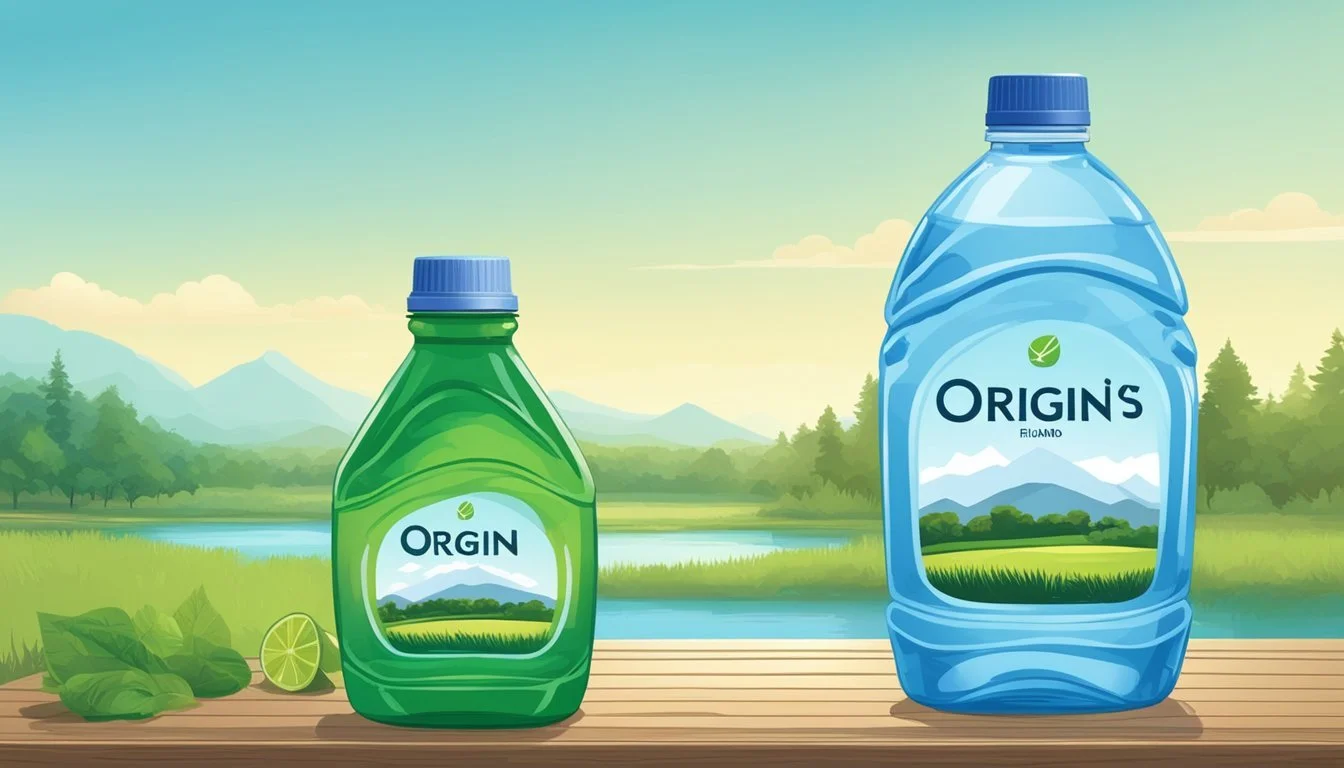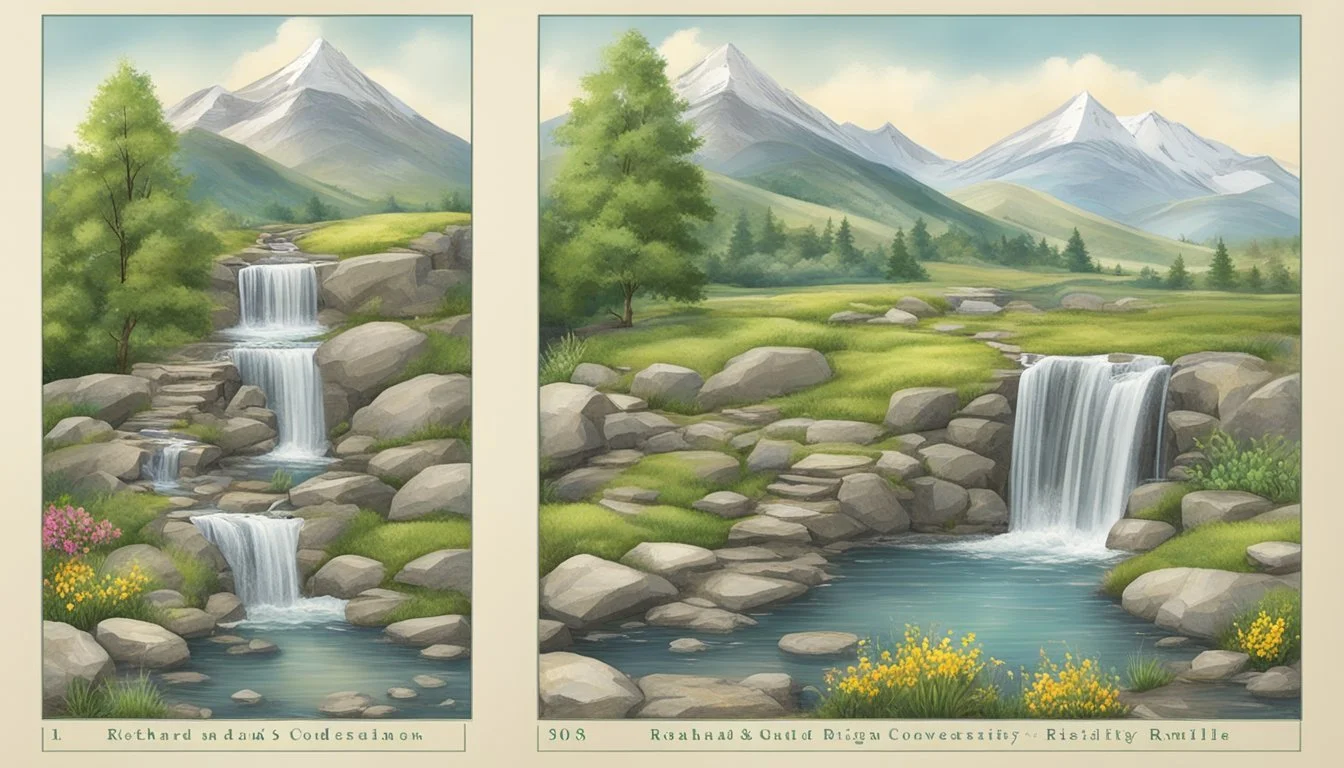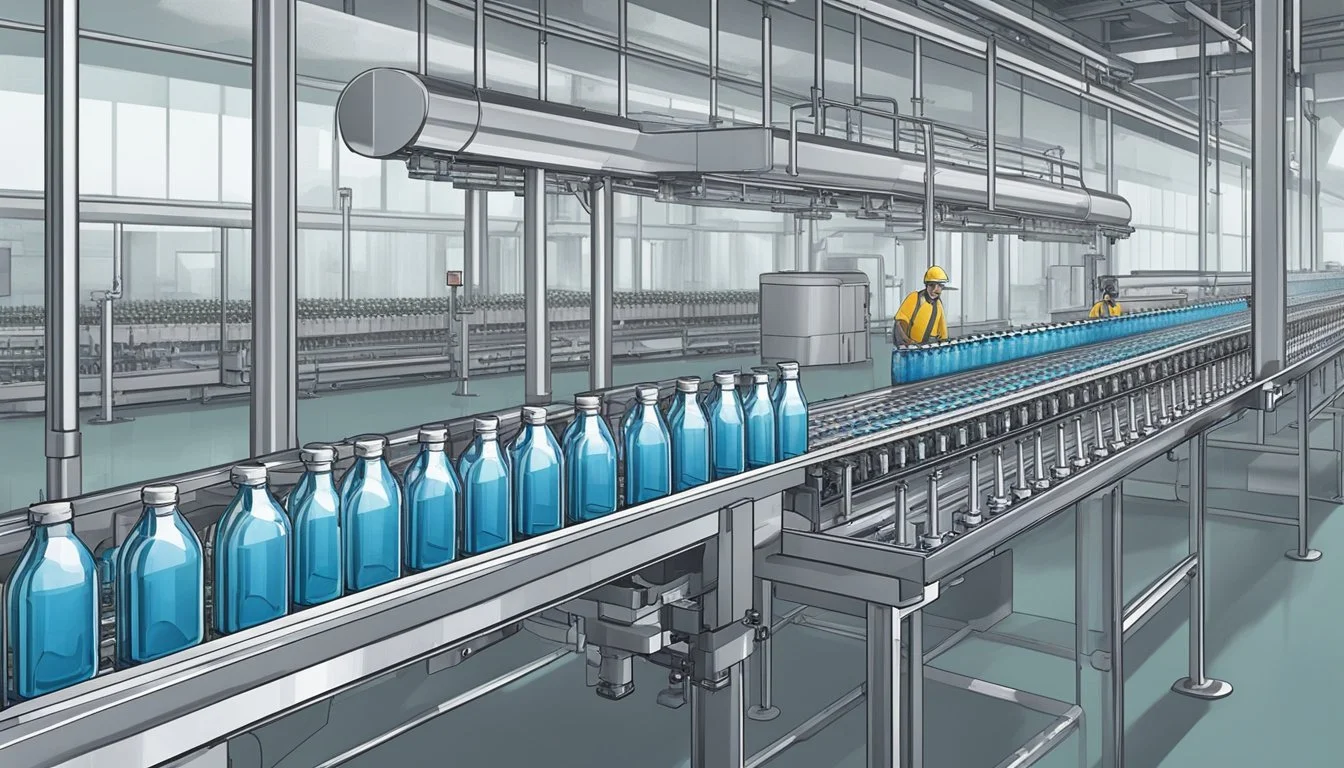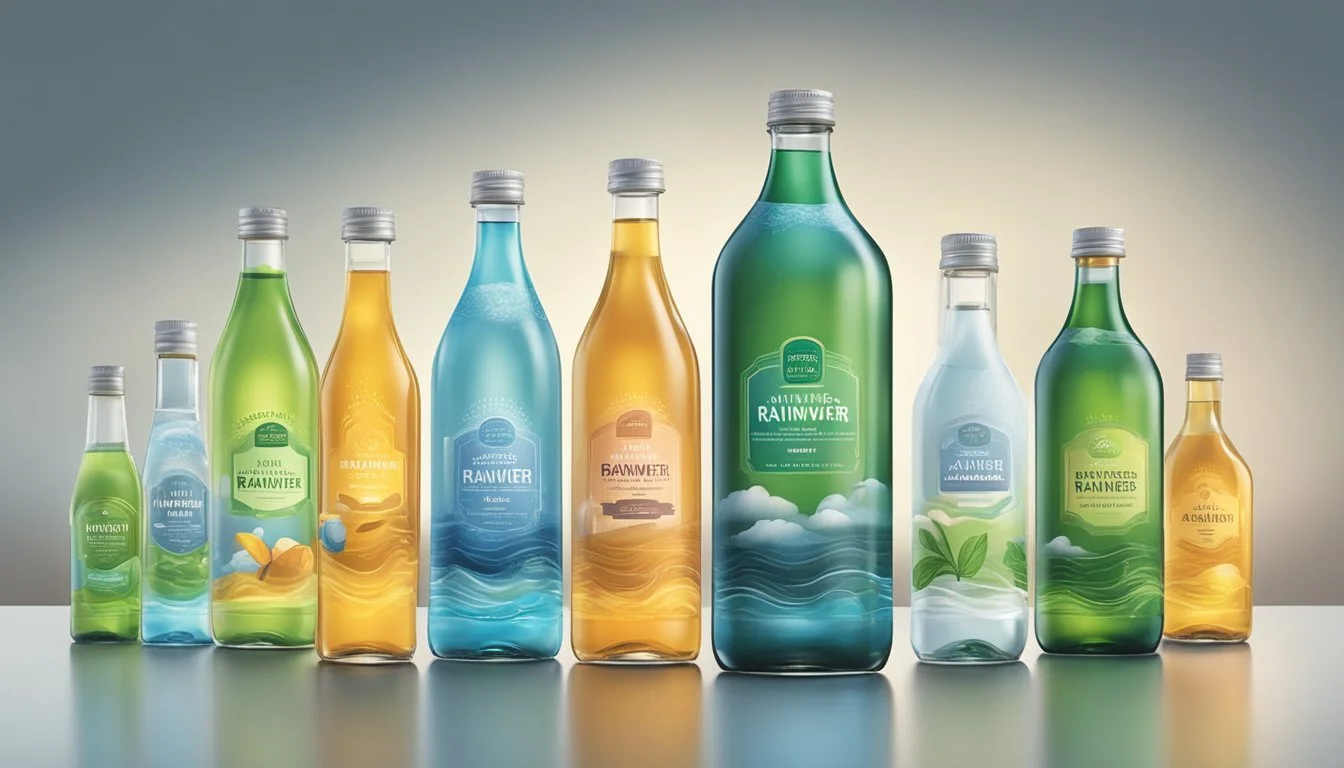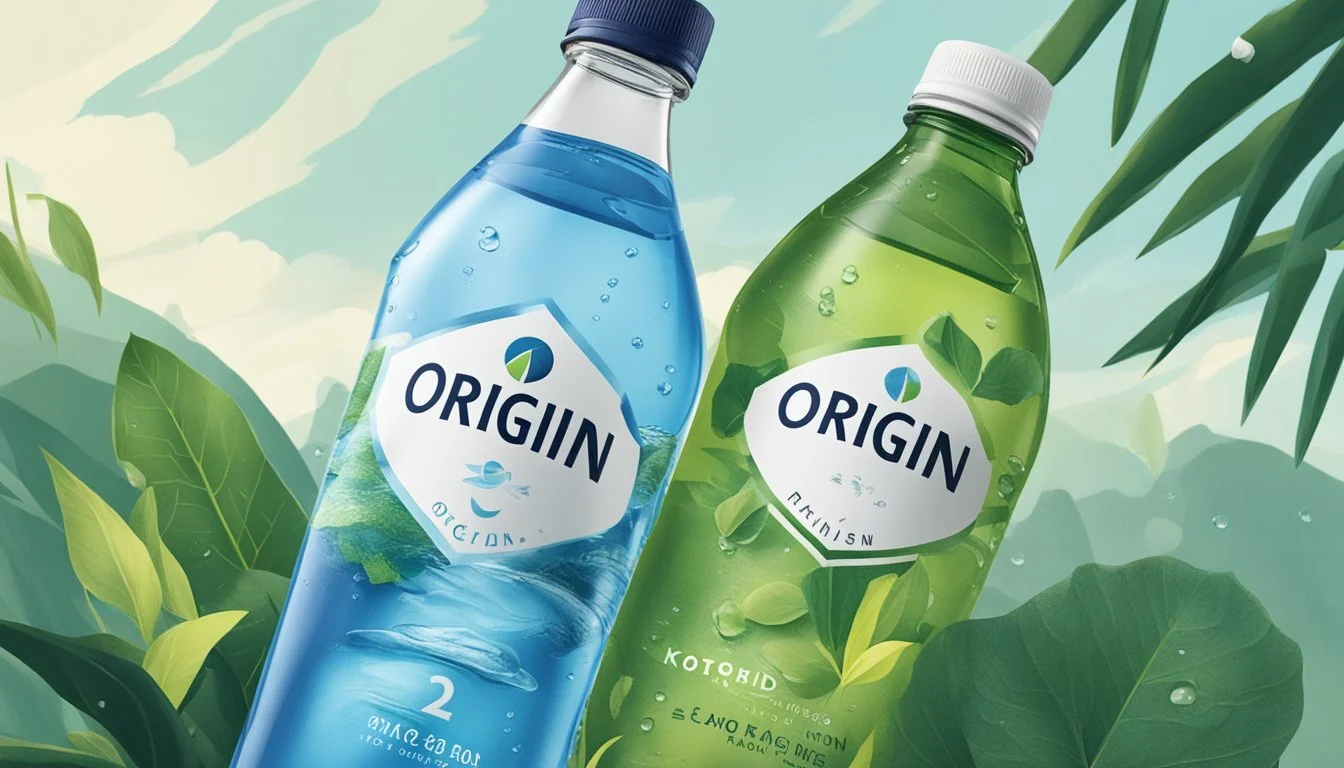Origin vs. Richard’s Rainwater
Comparing the Best Bottled Waters
Bottled water options are plentiful, but only a few stand out for their unique sources and processes. Among the top contenders are Origin and Richard’s Rainwater, each offering something distinct. Origin is known for its pristine natural spring water sourced from protected environments. On the other hand, Richard’s Rainwater captures rain at its purest form, even before it hits the ground, utilizing a zero-waste, chlorine-free filtration system.
Richard’s Rainwater has been gaining attention for its sustainability approach, collecting water from rain and preventing storm runoff from urban areas. This process saved over 400,000 gallons of water last year, highlighting a significant environmental benefit. Additionally, it offers the added value of being available at major retailers like Whole Foods and Kroger.
When comparing Origin and Richard’s Rainwater, the deciding factor often comes down to the source and environmental impact. Origin’s naturally sourced spring water is untouched and pure, perfect for those who prefer a traditional, established choice. Meanwhile, Richard’s Rainwater appeals to the environmentally conscious consumer, offering purity from the sky with minimal ecological footprint.
The Emergence of Bottled Rainwater
Bottled rainwater has emerged as a sustainable hydration option, leveraging natural precipitation to produce potable water. Richard’s Rainwater stands out in this niche market due to their innovative collection and filtration methods.
A Glimpse into the Rainwater Market
Rainwater collection for potable use represents a shift towards eco-friendly water sourcing. Companies like Richard’s Rainwater harness the most renewable water source—rain—before it reaches the ground. This avoids contaminants typically acquired from urban runoff.
Rainwater harvesting appeals to consumers concerned with sustainability and purity. Each inch of rain on 1,000 square feet of collection area can yield around 550 gallons of clean water. This translates to significant environmental benefits by reducing strain on conventional water sources.
Understanding Richard's Rainwater
Richard’s Rainwater capitalizes on collecting rain before it contacts the ground, ensuring higher purity. Using a proprietary, zero-waste filtration system, they remove impurities like biological contaminants and particulates without utilizing chlorine.
With operations in New Orleans and other locations, Richard’s Rainwater collected approximately 4 million gallons in 2022 alone. Their methods not only deliver clean drinking water but also contribute to water conservation efforts by making over five times more water available for drinking compared to standard sources.
Their products—packaged in bottles and cans—are 100% potable, with rain being positioned as the purest, most renewable drinking water available. This model combines environmental stewardship with practical consumer benefits, resonating well with eco-conscious buyers.
Environmental Impacts and Sustainability
When evaluating the environmental impacts and sustainability of Origin and Richard’s Rainwater, important factors include their bottling solutions, the renewability of their water sources, and their initiatives towards achieving zero waste.
Eco-Friendly Bottling Solutions
Richard’s Rainwater employs glass bottles and recyclable aluminum cans to reduce plastic pollution. These materials are chosen for their lower carbon footprint compared to plastic bottles.
On the other hand, Origin emphasizes the use of 100% recycled plastic bottles, aiming to minimize new plastic production. Both brands focus on sustainability by ensuring their packaging materials contribute less to environmental degradation and are recyclable.
Water as a Renewable Resource
Richard’s Rainwater harvests rainwater, tapping into a renewable and sustainable source. The company collects rainwater in tanks, making it potable and suitable for consumption without depleting natural aquifers.
Origin sources its water from underground springs, which, while renewable, require careful management to prevent over-extraction. The contrast lies in the replenishment rate—rainwater is typically replenished faster, providing a more sustainable option.
Zero-Waste Initiatives in Water Brands
Richard’s Rainwater promotes zero-waste by not only using recyclable materials but also by offsetting their carbon footprint through various environmental projects. This net-positive impact approach includes community involvement in sustainability practices.
Origin also participates in zero-waste practices by ensuring their production processes minimize waste and by supporting local community recycling programs. Both brands show a commitment to reducing their environmental impact, but Richard’s Rainwater’s emphasis on renewable water positions it as a more net-positive player in the water industry.
Health and Quality Considerations
Evaluating the health and quality aspects of Origin and Richard’s Rainwater involves analyzing purity, cleanliness, and compliance with bottled water standards.
Purity and Cleanliness of Water
Richard’s Rainwater captures rain in its purest form before it touches the ground, minimizing contamination risk.
Their proprietary filtration system ensures nearly zero waste, producing potable rainwater free from pollutants.
Origin, on the other hand, often sources water from groundwater, which may contain minerals and chemicals picked up from soil and rock layers.
This water typically goes through a rigorous filtration process, including removal of impurities like chlorine and fluoride. Both brands aim for high purity, yet Richard’s Rainwater benefits from the natural renewal cycle of rain, potentially offering cleaner initial water.
Bottled Water Standards and Regulations
Bottled water must comply with stringent standards set by authorities like the FDA in the US.
Richard’s Rainwater emphasizes sustainability and purity, adhering to and exceeding these guidelines by ensuring minimal chemical contamination.
It’s essential for brands to maintain BPA-free packaging to avoid health risks associated with bisphenol A (BPA) and similar compounds.
Origin also follows strict standards, aiming for consistent quality in every bottle. Their filtration systems are designed to meet all regulatory requirements, ensuring safe, drinkable water.
Both brands invest heavily in quality control to ensure their water remains clean, pure, and safe for consumption.
The Bottling Process
In comparing Origin to Richard’s Rainwater, it's essential to consider the distinct bottling processes of each brand. This includes the collection methods and the innovative practices each company employs to ensure quality and sustainability.
From Collection to Consumption
Richard’s Rainwater begins its journey by capturing rainwater from strategically selected sites, such as Tank Town in Texas and Lazy Magnolia in Mississippi. They also utilize a location in Oregon to expand their collection network.
Captured rainwater undergoes rigorous filtration, making it potable. State-approved filters play a crucial role in maintaining water purity. The purified water is then packaged in bottles and cans promptly to retain its freshness.
By focusing on rain capture, Richard’s Rainwater avoids depleting natural aquifers or other water sources. This sustainable approach sets them apart from traditional bottled water companies that often rely on springs or groundwater.
Innovative Practices at Richard's Rainwater
Richard’s Rainwater employs several innovative techniques throughout its bottling process. For instance, they utilize advanced filtration systems to ensure the water meets high safety and quality standards.
Another unique aspect is their commitment to sustainability. The entire process, from collection to bottling, is designed to have minimal environmental impact. This includes using eco-friendly materials for packaging and reducing reliance on plastic products.
Additionally, Richard’s Rainwater has created partnerships with local businesses, like the Kiln brewery in Mississippi, to support the community and promote sustainable practices.
By implementing these innovations, Richard’s Rainwater not only delivers a premium product but also contributes positively to environmental conservation efforts.
Industry and Consumer Landscape
Richard’s Rainwater and Origin are competitors in the bottled water market, each leveraging unique selling points to gain market traction. Understanding their market penetration and consumer preferences offers insights into their respective industry standings.
Market Penetration and Retail Presence
Richard's Rainwater has strategically expanded its retail presence, gaining shelf space in Whole Foods Market, HEB, Central Market, Sprouts, and even online via Amazon. Its unique branding and the concept of rainwater collection have piqued consumer interest. This brand aims to revolutionize the industry by promoting an eco-friendlier option.
On the other hand, Origin also boasts significant retail coverage, particularly across mainstream supermarkets and health-centric stores. It emphasizes purity and taste, attracting consumers looking for premium bottled water. Its widespread distribution ensures availability to a broad demographic, enhancing its competitive stance.
Consumer Behavior and Preferences
Consumers are increasingly inclined towards sustainable and health-positive products. Richard’s Rainwater caters to this trend with its focus on rainwater harvesting. The brand’s refreshing design and innovative marketing, such as encouraging people to “Sip the Sky,” resonate well with environmentally conscious buyers.
Origin appeals to those prioritizing taste and premium quality. Its branding highlights the pure essence and natural filtration processes. Consumers seeking consistency in flavor and purity often choose Origin, valuing its reputation for excellence.
Both brands successfully navigate consumer demands, yet target slightly different market segments, with Richard’s Rainwater leaning towards sustainability and Origin focusing on taste and quality. The dynamic in consumer preferences allows both brands to thrive in their niches.
Brand Identity and Marketing Strategies
Origin and Richard's Rainwater demonstrate distinct approaches in shaping their brand identities and engaging with their audiences through marketing strategies. These approaches encompass the creation of unique images and their interactions across various online platforms.
Crafting a Unique Brand Image
Richard's Rainwater emphasizes sustainability and environmental responsibility. Founded by Richard Heinichen, the brand highlights its unique sourcing method—collecting and filtering rainwater for bottling. This ecological focus appeals to environmentally-conscious consumers.
Origin's brand image centers around purity and nature, promoting itself as untouched by human hands. Their marketing often focuses on the natural sources and pristine conditions of their water, targeting premium market segments that value purity and exclusivity.
Both brands feature partnerships to enhance their image. Richard's Rainwater collaborates with local entities like Faubourg Brewing Co and retail giants such as Whole Foods and Kroger. These alliances amplify their reach and credibility. Origin partners with luxury venues, complementing its elite brand positioning.
Online Presence and Social Media Engagement
Richard's Rainwater maintains dynamic online engagement through platforms like Instagram, Twitter, and LinkedIn. Their social media content frequently features educational posts about sustainability, testimonials, and updates on community initiatives. This interactive approach fosters a robust online following and reinforces their brand narrative.
Origin leverages visually appealing content to highlight the purity and exclusivity of their product. Their social media presence focuses on high-quality images and videos that resonate with a luxury audience. Origin's strategy includes collaborations with influencers and participation in upscale events to enhance visibility and attract their target demographic.
Despite differing in thematic focus, both brands use digital marketing to cultivate loyal customers and expand their market presence effectively.
The Taste and Varieties of Bottled Rainwater
Consumers have a variety of bottled rainwater options, and the taste profile, as well as the added effervescence, play crucial roles in preferences. From the pure essence of still water to the invigorating experience of sparkling water, the options cater to a range of desires.
Still vs. Sparkling: The Battle of the Bubbles
Still water and sparkling water appeal to different taste buds. Still water offers a clean, nearly neutral flavor without any bubbles, making it similar to high-quality spring or well water. It is ideal for those who appreciate the uncomplicated purity of fresh rain.
Sparkling water, on the other hand, provides a lively, refreshing mouthfeel thanks to its bubbles. This effervescence can make the water feel more invigorating and can enhance the perception of freshness. Many prefer sparkling water for its unique texture and mild tingling sensation on the palate.
Consumer Taste Tests and Feedback
Consumer feedback on bottled rainwater has been largely positive. Taste tests reveal that many appreciate the subtle, clean nature of still rainwater, which lacks the metallic or chemical aftertaste sometimes found in tap water. Consumers often describe still rainwater as "crisp" and "refreshing."
Sparkling rainwater also scores high in taste tests, especially among those who enjoy the fizzy quality. The bubbles add a layer of enjoyment that sparkling water fans love. Descriptors like "invigorating" and "bright" come up frequently in feedback, making it apparent that carbonation adds to the drinking experience.
Combining the purity of rainwater with the variety of still and sparkling options caters to diverse consumer preferences, setting bottled rainwater apart from its competitors.
Collaborations and Partnerships
Richard’s Rainwater has strategically partnered with various organizations to enhance its growth and reach. These collaborations focus on expanding distribution and community engagement.
Strategic Partners in Growth and Distribution
Richard's Rainwater has joined forces with Faubourg Brewing Co. and its parent company, Made By The Water, LLC. This partnership led to the creation of the world’s largest potable rainwater collection site in Louisiana.
Their approach ensures efficient rainwater harvesting, leveraging local resources. These collaborations help scale operations and are pivotal for meeting increasing demand.
Strategic alliances also include partnerships with local communities. Richard's Rainwater collaborates with these communities to promote the benefits of sustainable water sources. This involvement supports both environmental goals and public health initiatives, making bottled rainwater accessible and beneficial.
Conclusion
When comparing Origin and Richard’s Rainwater, several key differences emerge.
Source of Water:
Origin: Typically sourced from natural springs and underground reservoirs.
Richard's Rainwater: Collected directly from rainwater, utilizing a proprietary zero-waste filtration system.
Sustainability:
Richard’s Rainwater: Emphasizes sustainability with a net-positive water model.
Origin: Often relies on groundwater, which can have varied environmental impacts.
Processing Methods:
Richard’s Rainwater: Uses a chlorine-free system to remove contaminants.
Origin: Generally uses standard purification methods.
Resource Utilization:
Richard’s Rainwater claims it can generate over five times more drinking water than conventional methods.
Distribution:
Richard’s Rainwater: Bottled on-site to reduce transportation-related carbon footprint.
Origin: Typically bottled at source and then distributed.
Given these points, both bottled waters offer unique benefits tailored to different preferences and values in drinking water.
More About Origin
Mountain Valley Spring Water vs Origin: Which Bottled Water is Better?
Origin vs Kirkland Signature: Which Bottled Water is Better?
Origin vs Whole Foods Italian Still Mineral water: Which Bottled Water is Better?
More About Richard’s Rainwater
Acqua Pana vs Richard's Rainwater: Which Bottled Water is Better?
Alkaline88 vs Richard's Rainwater: Which Bottled Water is Better?
Antipodes vs Richard's Rainwater: Which Bottled Water is Better?
Aqua Carpatica vs Richard's Rainwater: Which Bottled Water is Better?
Aquafina vs Richard's Rainwater: Which Bottled Water is Better?
Arrowhead vs Richard's Rainwater: Which Bottled Water is Better?
Boxed Water vs Richard's Rainwater: Which Bottled Water is Better?
Cascade Mountain vs Richard's Rainwater: Which Bottled Water is Better?
Castle Rock vs Richard's Rainwater: Which Bottled Water is Better?
Cirro vs Richard's Rainwater: Which Bottled Water is Better?
Richard's Rainwater vs HFactor: Which Bottled Water is Better?
Core Hydration vs Richard's Rainwater: Which Bottled Water is Better?
Crystal Geyser vs Richard's Rainwater: Which Bottled Water is Better?
Deer Park vs Richard's Rainwater: Which Bottled Water is Better?
Erewhon vs Richard's Rainwater: Which Bottled Water is Better?
Essentia vs Richard's Rainwater: Which Bottled Water is Better?
Eternal vs Richard's Rainwater: Which Bottled Water is Better?
Ethos vs Richard's Rainwater: Which Bottled Water is Better?
Evian vs Richard's Rainwater: Which Bottled Water is Better?
Hawaii Volcanic vs Richard's Rainwater: Which Bottled Water is Better?
Hawaiian Springs vs Richard's Rainwater: Which Bottled Water is Better?
Ice Mountain vs Richard's Rainwater: Which Bottled Water is Better?
Icelandic Glacial vs Richard's Rainwater: Which Bottled Water is Better?
Just Water vs Richard's Rainwater: Which Bottled Water is Better?
Kroger vs Richard's Rainwater: Which Bottled Water is Better?
LIFEWTR vs Richard's Rainwater: Which Bottled Water is Better?
Liquid Death vs Richard's Rainwater: Which Bottled Water is Better?
Mananalu vs Richard's Rainwater: Which Bottled Water is Better?
Mountain Valley Spring Water vs Richard's Rainwater: Which Bottled Water is Better?
Nestle Pure Life vs Richard's Rainwater: Which Bottled Water is Better?
Ozarka vs Richard's Rainwater: Which Bottled Water is Better?
Penta vs Richard's Rainwater: Which Bottled Water is Better?
Perrier vs Richard's Rainwater: Which Bottled Water is Better?
Poland Spring vs Richard's Rainwater: Which Bottled Water is Better?
Purely Sedona vs Richard's Rainwater: Which Bottled Water is Better?
Richard's Rainwater vs 1907water: Which Bottled Water is Better?
Richard's Rainwater vs 7-Select: Which Bottled Water is Better?
Richard's Rainwater vs Action: Which Bottled Water is Better?
Richard's Rainwater vs Big Chill: Which Bottled Water is Better?
Richard's Rainwater vs Big Win: Which Bottled Water is Better?
Richard's Rainwater vs BodyArmor: Which Bottled Water is Better?
Richard's Rainwater vs CBD Living: Which Bottled Water is Better?
Richard's Rainwater vs Crystal Lake: Which Bottled Water is Better?
Richard's Rainwater vs Dasani: Which Bottled Water is Better?
Richard's Rainwater vs Essence pH10: Which Bottled Water is Better?
Richard's Rainwater vs Kirkland Signature: Which Bottled Water is Better?
Richard's Rainwater vs Open Water: Which Bottled Water is Better?
Richard's Rainwater vs Ophora: Which Bottled Water is Better?
Richard's Rainwater vs Proud Source: Which Bottled Water is Better?
Richard's Rainwater vs Pure Life: Which Bottled Water is Better?
Richard's Rainwater vs Ramona: Which Bottled Water is Better?
Richard's Rainwater vs Refreshe: Which Bottled Water is Better?
Richard's Rainwater vs Simple Truth: Which Bottled Water is Better?
Richard's Rainwater vs Skyra: Which Bottled Water is Better?
Richard's Rainwater vs Talking Rain AQA: Which Bottled Water is Better?
Richard's Rainwater vs The Well: Which Bottled Water is Better?
Richard's Rainwater vs Weird Water: Which Bottled Water is Better?
Richard's Rainwater vs Whole Foods 365: Which Bottled Water is Better?
Richard's Rainwater vs Zenwtr: Which Bottled Water is Better?
San Pellegrino vs Richard's Rainwater: Which Bottled Water is Better?
Smartwater vs Richard's Rainwater: Which Bottled Water is Better?
Solan de Cabras vs Richard's Rainwater: Which Bottled Water is Better?
Starkey vs Richard's Rainwater: Which Bottled Water is Better?
Tahoe vs Richard's Rainwater: Which Bottled Water is Better?
Topo Chico vs Richard's Rainwater: Which Bottled Water is Better?
Tru Alka vs Richard's Rainwater: Which Bottled Water is Better?
Volvic vs Richard's Rainwater: Which Bottled Water is Better?
Waiakea vs Richard's Rainwater: Which Bottled Water is Better?
Whole Foods Italian Still Mineral water vs Richard's Rainwater: Which Bottled Water is Better?
Zephyrhills vs Richard's Rainwater: Which Bottled Water is Better?

